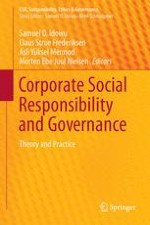2015 | OriginalPaper | Chapter
11. Development of Sustainability Reporting Frameworks: The Case of Australia
Author : Nigel Finch
Published in: Corporate Social Responsibility and Governance
Publisher: Springer International Publishing
Activate our intelligent search to find suitable subject content or patents.
Select sections of text to find matching patents with Artificial Intelligence. powered by
Select sections of text to find additional relevant content using AI-assisted search. powered by
